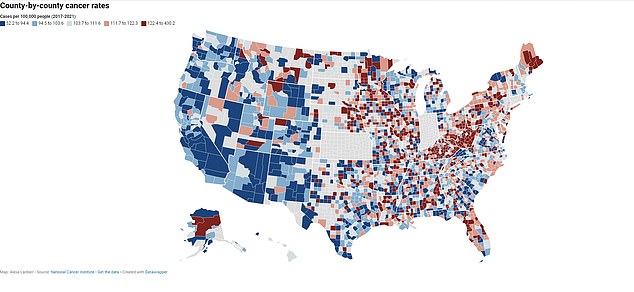Cancerville, US: Shocking interactive map reveals hotspots where young people are hit hardest by disease – see the numbers in your area



An official government map shows the biggest hotspots for young cancer patients in America.
The data comes as the disease is increasing nationwide among Americans under 50, even among those who appear relatively fit and healthy.
The map, based on the most recent 2021 data from the National Cancer Institute, shows the number of cancer cases per 100,000 residents under age 50.
The figures were collected from more than 2,500 U.S. counties, although data was missing for Kansas and Indiana.
The top five was completed by rural communities in the South and Midwest.
Union County in Florida had the highest rate of early-onset cancer, with 430 cases per 100,000 residents.
Southwest of Jacksonville lies a rural area of just 15,000 people, historically at the top of the list for the most common cases of lung, oral, colorectal and skin cancers.
Health officials believe this is due to the area’s high smoking rate and lack of health care funding, as well as one in six residents living in poverty.
Poverty is associated with poor diet, poor sleep, heavy alcohol consumption and other factors that increase the risk of cancer.
Fisher County, Texas, has the second highest rate of 213 per 100,000 residents. Additional data shows that this is because one in five residents does not have health insurance, meaning they are likely to neglect preventive screenings.
The top five was completed by rural communities in Nebraska, Arkansas and West Virginia.
Currituck County in North Carolina had the lowest cancer rate among people under 50. This may be because household incomes are higher than the national average and the population is more urban than in counties with higher rates.
While rates of chronic diseases such as diabetes are up to 35 percent higher than the national average, the border community scores below the national average for lung, bronchial and breast cancer, state health data shows.
The high numbers in Union County may be the result of a combination of poor health outcomes.
According to a recent report from the Institutes for Health Metrics and Evaluation, Union County is the least healthy county in the U.S.
The data shows that most deaths in the US from HIV/AIDS and tuberculosis are small.
In terms of cancer, the area scores two to six times higher than the national figures for tracheal, bronchial, lung, kidney, liver, oral, colorectal, testicular and pancreatic cancers.
Life expectancy in the region is also just 67 years, well below the national average of 76 years, according to American News and World Report.
In 2014, Union County Health Officer Joe Pietrangelo said, said The department consistently struggled with a lack of funding, preventing it from providing services such as screenings to vulnerable residents.
Census data from 2022 also shows that 16 percent of residents live in poverty, 25 percent higher than the national average of 12.5 percent.

The following map shows the number of cancer cases in people under 50 in more than 2,500 U.S. counties
Fisher County, Texas, had the second-highest rate of cancer among under-50s. While the area’s smoking rate of 16.5 percent is about 13 percent lower than the national average, 17.6 percent of residents lack health insurance, which could prevent them from keeping up with preventive screenings like colonoscopies.
Thayer County, Nebraska, rounded out the top three, with 204 cases per 100,000 people. With just 3,600 residents, one in 10 lives in poverty, according to Census data.
Because Nebraska is surrounded by vast agricultural areas, pesticide use may also contribute to high cancer rates among young people. Report 2019 For example, environmental organization Green Matters found that Nebraska has the third highest use of the herbicide glyphosate, after Illinois and Iowa.
Although the Environmental Protection Agency (EPA) believes the chemical is “probably not a carcinogen,” the topic has been widely debated in research. However, the International Agency for Research on Cancer, part of the World Health Organization, has classified it as “probably carcinogenic to humans.”
Woodruff County in Arkansas and Webster County in West Virginia ranked fourth and fifth, with 191 and 184 cases per 100,000 residents, respectively.

Experts suggest that the high rates in these areas may be a result of low family incomes, high poverty rates and increased pesticide use.
On the other hand, Currituck County, North Carolina, had the lowest incidence, with 55 cases per 100,000 people. With a population of 28,100, the NCI classifies this county as “urban.”
The lower rates may be due to household income, which is just under $83,000, about 10 percent above the national average of $74,000. Additionally, only 8.5 percent of residents live in poverty, compared to the national average of 12.5 percent.
These factors can help residents afford health insurance, screenings, and doctor visits, which can reduce the risk of developing cancer at a young age.




